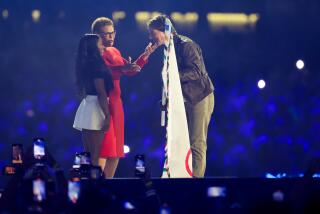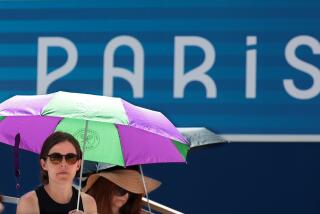WORLD CUP USA 1994 : The Standard Is Set : French Rave About ’94 as They Prepare to Play Host in ’98
- Share via
We had hamburgers; they’ll probably have baguettes.
We had nachos with cheese; they’ll probably have escargots and garlic butter.
We drank Diet Coke; they prefer red wine.
We had the New Jersey swamplands; they have the Champs Elysees.
We made our visitors suffer through the stifling heat and humidity of midday games; they’ll start games in the late afternoon or cool of the evening, giving everyone time for sightseeing in the morning and enjoying the splendors of the Arc de Triomphe and Eiffel Tower at night.
But we had American ingenuity, which has enabled officials of the 1994 World Cup to put on a show that is already being held up as the standard for future tournaments. Can they top that?
Representatives of France ‘98, the committee charged with organizing the next tournament, have been studying every aspect of World Cup ’94 closely to learn what to do--and what not to do--when their country plays host to soccer’s biggest event. The 10-member committee, which is co-chaired by Michel Platini, a former international and World Cup star player, has sent delegates to absorb the atmosphere and watch the games at every venue.
They have examined and analyzed every facet of the massive operation and have spoken at length with World Cup ’94 executives, and their verdict is in:
Tres bien fait.
Very well done.
“It will be difficult for us to do better than the U.S.,” said Gerard Ernault, director of communications and special events for France ’98. “It will be a challenge for us. We have been very impressed.”
Ernault has visited Chicago, Dallas, San Francisco and the Rose Bowl and was in Pasadena for Wednesday’s semifinal between Brazil and Sweden. He and his fellow committee members gathered last week in Dallas to share their observations and attend a seminar run by Scott LeTellier, the chief operating officer of World Cup ‘94, who gave them an extensive look at what went into the planning and execution of the monthlong tournament.
Ernault said he and his colleagues came away unanimous in their raves about how well U.S. organizers have pulled off this enormous undertaking, as well as how warmly Americans have embraced the tournament. Ernault marvels at how smoothly everything has gone, including factors the World Cup committee could not control.
“It is a great competition, first thing,” Ernault said. “It is a good competition because there are very large stadiums and they are very full. They are large, and they are full of spectators and they are under the sun. It is a very pleasant ambience. The games are very good.
“There is also less violence than in Italy in 1990 or in Mexico in 1986. What we saw on the TV was also very good, and I think it is good for the people to see such a very good competition.
“Second, I believe it is also a good organization from World Cup ‘94, because it was a difficult thing to do. We were very impressed when we learned about the extent and complexity of what had to be done and what they have done. It (the U.S.) does not have the experience of soccer culture, and it has done a very good job.”
It is a job France ’98 will try to do as well, but under different circumstances and with its own flair.
The number of entrants will be expanded to 32 teams from 24, which will create more scheduling and logistic problems. However, Ernault believes the increase in contestants will make the World Cup a more representative competition.
“It will be the first time so many teams have participated. It will be the most universal World Cup ever, in 1998,” he said.
And while there’s no official theme to World Cup ‘94, Ernault said France ’98 will celebrate the World Cup’s past, present and its future, with an emphasis on its French heritage.
“It will be the last competition of the century,” he said, “and symbolically, for us, it’s very important because the World Cup was created by a French person, Jules Rimet, at the beginning of the century. And it was Jules Rimet who created FIFA.”
Some differences will arise of necessity. Crowds will be smaller than they were at games here, perhaps changing the ambience that Ernault so greatly admired. “We, unfortunately, do not have such large stadiums as you have,” he said. “Our stadiums hold about 40,000 people.”
Stadiums and host cities for 1998 have yet to be chosen, but Ernault said two stadiums in Paris will be used and that the games will be spread over eight to 10 cities. Nine U.S. cities hosted games, which led to some travel problems. However, France is about one-seventeenth the size of the United States and travel between cities is likely to be shorter and less complicated.
Starting times for the games in France will be more hospitable than the 12:30 p.m. and 1 p.m. kickoffs scheduled here in venues such as Orlando, Fla.; New Jersey; Palo Alto; Washington, D.C.; and Boston. Those midday starts were forced on players to ensure telecasts were aired in prime time in Europe, and players and coaches complained they couldn’t perform at their best in such heat. Those early starts won’t be necessary for games played in Europe. Some games probably will start at 4 or 5 p.m. and some at 8 or 9 p.m., when the heat of the day has dissipated.
One thing that might go unchanged, however, is the mixed zone, that hand-to-microphone combat area where reporters fight one another to get interviews with players. Ernault said he and his colleagues simply don’t know of a better system to implement.
“I have only hear rumors about it,” he said. “I believe the idea is not so bad, but maybe it has been not so well applied.”
More to Read
Go beyond the scoreboard
Get the latest on L.A.'s teams in the daily Sports Report newsletter.
You may occasionally receive promotional content from the Los Angeles Times.







